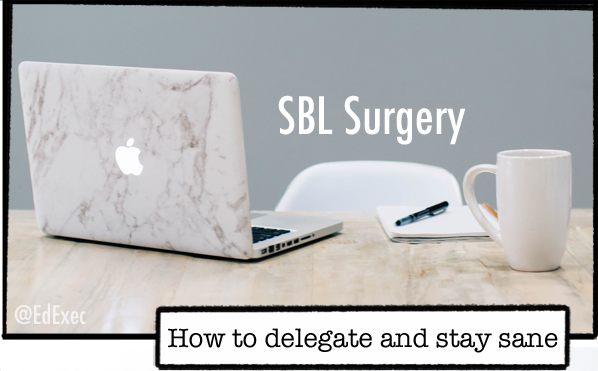I keep falling into the trap of ‘if I want something done right, I have to do it myself’, meaning I’m drowning under my workload because I struggle to delegate. My team is great, but it’s hard for me to let go of control. Help!
This one really hit home for me as I have struggled with this too! I used to tell myself, ‘It’s just easier if I do it’. Only when I found myself at breaking point in terms of workload did I really sit down and dig into this.
Was I finding it hard to let go because it was:
- something I enjoyed doing?
- a task where the stakes were so high that didn’t feel I could pass it on?
- a task I wasn’t clear enough about in terms of what needed to be done and what the end result should look like?
- something that I just couldn’t bring myself to trust other people with?
When I looked at the tasks that I didn’t delegate, but should have, all of these reasons cropped up.
Let’s unpack them.
If it’s a task that you enjoy doing, ask yourself if this is something you actually ‘should’ be doing. Is it the best use of your time? If someone else can do this task as well as you, then you should pass it on so you can focus on the more difficult and urgent tasks on your list. Also, consider whether you are holding onto this task because you’d rather be doing this than doing something else; you can tell yourself you’re ‘busy’ doing this but, really, it may be that you are avoiding tackling something more complex or daunting. It’s harsh but it’s true – and I’ve been there!
If it’s a high stakes task, it’s quite possible that it is something you shouldn’t delegate – but this doesn’t mean to say that you can’t be assisted with this type of task. Instead, look at splitting it up into smaller parts. Ask someone to do research, collate data, create tables or format a document. This way, you retain the accountability but won’t get buried in detail.
If you’re not clear on the end result it’s probably a task that involves some form of creativity or investigative work. As with high stakes tasks, break up the work into smaller chunks and look at how you could delegate elements of it to free up some of your time. You don’t have to do everything from start to finish!
If it’s a task that you can’t bring yourself to trust someone else with, it’s possibly because you don’t feel that they have the skills or the knowledge needed to do it to the standard that is required. That’s okay. It might well be true – but how will your team learn if they are not stretched? Is there someone on your team who has the capacity and interest to take on additional tasks and is looking to develop? Does this task facilitate some teachable moments and CPD opportunities?
You might be reading this and thinking ‘This is all great but I just don’t have the time to delegate!’ To this, I say, if you invest time in learning to delegate now, you will free up so much time for yourself in the future! I know, I know – we SBLs are true control freaks at heart, but there are systems and ‘fail safes’ you can put in place to help with that.
- Prioritisation – whether it’s a whole task you’re delegating, or part of a bigger task, your staff will need to be clear on precisely what needs to be done and when it needs to be done by. For more complex tasks, you might also have to specify a how and a why so they can do the task to the standard you require, and understand the context they are working in, as well as the overall importance of what they’re expected to do.
- Monitoring progress – ensure that you check in with your staff regularly so that you can answer any questions they have, provide feedback if things are going a bit awry and generally make them feel supported. This is especially important for new tasks where there is a steep learning curve. They won’t know what they don’t know, so keeping the communication lines open means that they won’t get stuck and you won’t be in for any surprises if there has been a misunderstanding somewhere along the line.
- Set sensible deadlines – don’t set a deadline that’s an hour before a critical meeting, or the day before an auditor is due to come in. Give yourself space to review the work that’s been done and to pick up on any issues. This will allow you enough time to either ask for any changes to be made or to make them yourself.
- Don’t give in to the temptation of micromanagement – delegation involves handing over some level of autonomy, especially if you’ve not specified how the task should be completed or it’s a task that you’ve handed over as a full project, from start to finish. These are the teachable moments so how you monitor progress, and how you provide feedback, is as much about supporting and developing your team as it is about getting the job done.
- Ask for feedback – as well as checking in throughout the process, make sure you ask your staff how they feel after the task has been completed. Ask them if you were clear, whether they had what they needed and whether they felt able to approach you with any questions.
There is no doubt that delegation requires a different way of working but, by being smart about it, you can still retain enough control to keep you sane, free up lots of time and demonstrate confidence and trust in your team.
If you’re still freaking out, take baby steps at first – choose sensible, straightforward tasks to delegate and set simple goals and deadlines that won’t trigger an apocalypse if something does go wrong. You CAN do this, and it will be SO worth it. Trust me!
Like what you’ve read? Subscribe to this blog by clicking here.
P.S. Have you joined The Business of School Leadership Facebook Group yet? For practical support, advice, tips, tools & guidance about all things school leadership, join us in the community by clicking here.
Written for: Education Executive Magazine (@edexec)




